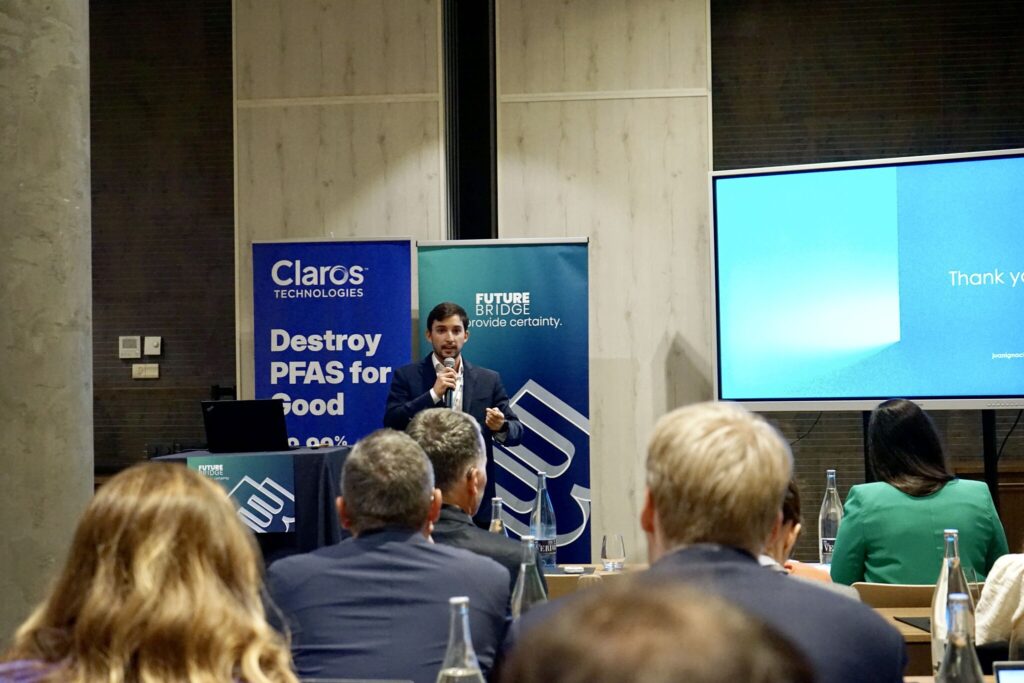The 2nd Industrial Water & Wastewater Management Summit 2025 in lovely Barcelona was not a conference; it was a serious confluence of industry players with varied insights. It consists of visionaries, innovators, & strategic thinkers. The European industrials are all encountering the same problem of water scarcity, new environmental laws that are even tighter, and a hike in operational expenses. So, there has never been a greater need for intelligent & sustainable solutions.
The summit stood to be the perfect setting for addressing innovative strategies. This ranges from pioneering wastewater treatment technologies to ensuring genuinely circular water patterns. Additionally, the two-day event led to the development of networking opportunities alongside expert-guided discussions & real-world case study analyses, all aiming at driving change. Hence, this article offers a comprehensive account of the event. It takes the reader through the most powerful sessions and features the Silver Sponsor’s vital contribution.
Sessions at the 2nd Industrial Water & Wastewater Management Summit 2025
The 2nd Industrial Water & Wastewater Management Summit 2025’s agenda was nothing less than a powerhouse. It combined strategic high-level advice and technical deep dives to support companies in their effort to go beyond mere compliance. The objective? To develop genuine water resilience & create sustainable value right within their industrial processes. This section reviews the key innovative ideas that were discussed during the many sessions of the agenda:
Riding the Wave of Innovation – Innovating for Resilience in Wastewater & Industrial Water Management
Speaker: Dr. Angela MACOSCAR, Head of Innovation, Northumbrian Water
The presenter kicked off with an inside look at Northumbrian Water’s system, demonstrating how they take bold ideas and turn them into effective, scalable solutions. Next, the conversation addressed the enormous challenges confronting the world’s water industry. It includes industrial needs & climate resilience, with good clarity on why wastewater innovation is absolutely vital today. Moreover, the speaker then gave real-life examples of game-changer technology and fresh mindsets. Additionally, the presentation emphasized the criticality of multidisciplinary collaboration and cross-geography collaborations to enable everyone to “go further, faster.” Lastly, the speaker gave key observations on how to navigate and attract investment to drive meaningful water projects locally and globally.
From Nature to Industry: Mineral-Based Strategies for Industrial Water Challenges
Speaker: Assiyeh TABATABAI, Senior Expert – W&ST, Lhoist
The speaker set out a brilliant, nature-inspired strategy, concentrating on how to incorporate calcium & magnesium chemistry into existing industrial water treatment flowsheets. Furthermore, the talk explained product innovation, which enables businesses to optimize consumption efficiency while minimizing the production of solid residue by a large margin. In addition, the speaker gave a crisp cost-benefit analysis to educate the attendees about the real value of embracing such new mineral-based solutions. Moreover, to make the theory a reality, the session presented successful case studies illustrating how these strategies meet regulatory requirements and skillfully optimize overall operational performance for industrial consumers.
High Throughput PFAS Destruction Using UV-Photochemical Process
Speaker: Zachary ROGERS, Director of Sales, Claros Technologies
This presentation provided an intimate overview of a novel UV-photochemical destruction technology, which instantly brought out the distinct strengths of:
- Scalability,
- High efficiency,
- And environmental safety.
The speaker produced compelling performance information from recent applications, graphically showing very rapid and high levels of PFAS destruction within much shorter treatment times. Additionally, the presentation included the company’s sophisticated PFAS analysis skills. These are totally required in order to provide proper tracking and conclusive verification of the destruction process. Moreover, these integrated abilities, the speaker went on to say, place the technology at the very leading edge of the future generation of PFAS remediation solutions.
Water Conservation and Business Continuity: Tackling Industrial Water Risk through Smart Water Management
Speaker: Hans-Ulrich BUCHHOLZ, Management Water/Waste Water & Biodiversity Operations, L’Oréal
The speaker at the 2nd Industrial Water & Wastewater Management Summit 2025 presented actionable frameworks for proactively addressing water risk through successfully mapping out possible exposure across operations. This naturally moved into emphasis on the development of resilience, in this case by encouraging attendees to adopt circular water practices in their own plants. The second part of the session was an explanation of how to attain data-driven security through predictive and early warning systems. To demonstrate the concepts are effective, the speaker presented strong case studies from water-dependent businesses. It showed that success in action stems directly from implementing smart water management principles to ensure business continuity.
From Data to Action – Digitalization Driving Sustainable Water Use in Agriculture
Speaker: Alejandro PÉREZ PASTOR, Full Professor, Universidad Politécnica de Cartagena
The speaker started off the session by showing major water efficiency measures that are utmost effective in the agriculture industry. Furthermore, the session went into the crucial role digitalization plays, discussing ways in which advanced equipment & data can transform farming. Next, the speaker addressed multiple approaches to sustainability that are put to use to make sure of long-term effects. Last, the session came to an end with a forward glance at innovations and future trends till now. It gave attendees a way to see how the technology will further shape/ refine the sustainable use of water in agricultural production globally.
Transforming Stewardship, Building Water Positive Industries
Speaker: Esmeralda Leyva, Vice President, Water Positive Think Tank
The speaker asked visitors to begin “Measuring What Matters,” i.e., looking beyond calculating footprints to making actual water-positive differences. The talk went on to highlight “Innovation Across the Water Cycle,” presenting:
- New technologies,
- Circular approaches,
- And biotech innovations that effectively transform waste into usable resources.
Moreover, the talk put focus on rethinking stewardship, which means taking the discussion beyond simple conservation and compliance to active regeneration. The session finished by emphasizing Collaborative Stewardship, explaining how industries, policymakers, & communities can actively co-create healthy, water-positive environments collectively.

From Commitment to Impact: Embedding Corporate Water Targets into Company Strategy
Speaker: Juan I. Sosa CALCAÑO, Water Corporate Lead, Moeve
The presenter listed the steps necessary to lay the foundation of a robust governance system and internal accountability to drive the corporate water strategy. One of the lessons drawn was the way water performance may be smartly integrated in the corporate scorecard to influence variable compensation for key employees. In addition, the presenter offered concrete case histories from a few business units to illustrate how the systems operate in practice. The presentation also addressed the importance of third-party validation. It also described how Moeve syncs this all-encompassing water strategy to global stewardship frameworks and increasing EU regulatory drivers.
How water stewardship can support climate & water resilience
Speaker: Achim DREWES, Sustainability & Stakeholder Relations, Nestlé Waters & Premium Beverages
The presenter at the 2nd Industrial Water & Wastewater Management Summit 2025 started with a real-world examination of water risk and resilience in the beverage industry, offering informed industry insight. Additionally, the presentation continued to describe the integrated approach of Nestlé Waters and Premium Beverages to proactive Water Stewardship and Water Regeneration. To make these initiatives more concrete, the presenter offered real-life project examples from the company’s activities in the industry. In total, the session demonstrated the robust, synergistic relationship between strong water stewardship practices. It effectively builds resilience to broader water stress and climate hardship.
PANEL DISCUSSION: Building resilient and sustainable water futures across industries
MODERATOR: Assiyeh Tabatabai, Senior Expert – W&ST, Lhoist
Speakers: Dr. Angela MACOSCAR, Head of Innovation, Northumbrian Water; Achim DREWES, Sustainability and Stakeholder Relations, Nestlé Waters & Premium Beverages; Hans-Ulrich BUCHHOLZ, Management Water/Waste Water & Biodiversity Operations, L’Oréal
The senior-level discussion brought together industry leaders to share real-world experience & collaborate on solutions when it comes to shared challenges. The conversation posed the question of how industries can significantly lower their collective water footprint. It then turned to consider the role of innovation and digital tools in driving water efficiency more broadly. In addition, the panellists touched upon the way regulators and companies could work together better. Above all, the session concluded with a rousing debate on the Future Vision—how sustainable water management has to be in 2030.
Water disclosure as a competitive advantage in a changing world
Speaker: Joe RAY, Head of Water, CDP
The presenter began by presenting powerful 2024 CDP data findings on industrial water challenges around the world. It made use of disclosures from more than 8,500 companies globally. Furthermore, the speaker eloquently made the point that water disclosure is now a compliance activity, but it is becoming a major competitiveness, resilience, and regulation-readiness driver. Moreover, participants learned to connect their technical work on water and wastewater management more effectively with key boardroom decisions and growing investor scrutiny. The session also provided actionable steps to substantially enhance the quality of their disclosure and leverage it for operational/ reputation benefits.
Recovery of Resources from Industrial Wastewater: Technologies and Case Studies
Speaker: Xavier MARTINEZ LLADÓ, PH.D., Director of the Technological Unit of Water, Air and Soil, Fundació Eurecat
The presenter discussed frontier ideas and technologies for maximizing the utility value achievable from industrial wastewater streams. The presentation addressed key processes such as wastewater reclamation and reuse for various applications. Furthermore, the speaker continued with detailing certain techniques for the recovery of material resources directly from the wastewater itself. Moreover, the presentation overviewed technologies targeting wastewater for energy conversion. So, the session was based on a combination of technological descriptions and real-life case studies. This is to present successful resource recovery projects in practice.
Fostering water resilience in Catalonia: Insights from a water-scarce Mediterranean region
Speaker: Lucia GUSMAROLI, European Projects Area Manager, Catalan Water Partnership
The presenter presented an impressive overview of the water resilience actions already taken in Catalonia, a Mediterranean water-short country. Amongst the key messages highlighted was the necessity for strong cross-sectoral and interregional cooperation. This is to effectively address common water problems. Moreover, the session enumerated particular circular water management practices in agrifood systems. In addition, the presenter discussed local initiatives in the reclamation and reuse of water in the industrial sector. The topic also mentioned important climate change adaptation actions being pursued to ensure long-term water resilience in the region.
Impact of the pharmaceutical industry on the water cycle: Bracco sustainability strategy
Speaker: Mariassunta FIORI, Global HSE Director, Bracco Imaging S.p.A.
The speaker at the 2nd Industrial Water & Wastewater Management Summit 2025 presented Bracco’s dedicated engagement towards sustainability on water. It also highlighted the principal pillars of their corporate strategy. Furthermore, the presentation focused particularly on the influence of the pharmaceutical sector on water resources and the entire water cycle from its activities. Moreover, the session presented an overview of the wastewater treatment methods used by the company in its process plants to reduce discharge impact. Ample emphasis was also laid on solving the essential problem of the end-of-life of products. It helps to reduce their environmental impact on water.
Constructed wetlands and closed-loop water cycle systems
Speaker: Omar Melendez SILVA, Professor at UMA Mexico & Energy management specialist, Mercedes-Benz
The speaker began by setting out the key issues in industrial wastewater management and describing the opportunities that nature-based solutions offer. The technical demands for constructing and running constructed wetlands for high-efficiency treatment were the central part of the session. Moreover, the presentation then shifted to the implementation of closed-loop cycles of water in business as a stable measure of consumption reduction. Lastly, the session offered real-life case studies from Europe and Latin America, which highlighted decentralized/ sustainable treatment approaches.
Results, forecasts, and challenges of the Spanish water companies
Speaker: Agustí FERRER, General Manager AQUA ESPAÑA, The Spanish Association of water companies
The presenter presented a thorough examination based on the results of the Annual Barometer report authored by AQUA ESPAÑA. It is crucial to interpret the performance, projection, and difficulties presently facing Spanish water sector businesses. Additionally, the session presented a clear/concise summary of the chief outcomes. It gave a solid, current image of the economic & operational situation of the Spanish water market, as well as projected future direction.
CLOSING PANEL DISCUSSION: The Future of Industrial Water – From Challenges to Opportunities
MODERATOR: Xavier MARTINEZ LLADÓ, PH.D.Z, Director of the Technological Unit of Water, Air and Soil, Fundació Eurecat
Speakers: Mariassunta FIORI, Global HSE Director, Bracco Imaging SpA; Vittorio LABBRUZZO, Environmental and Sustainability Director, Bracco Imaging SpA; Omar Melendez SILVA, Professor at UMA Mexico & Energy management specialist, Mercedes Benz
This panel at the 2nd Industrial Water & Wastewater Management Summit 2025 gave a compelling perspective forward, based on how businesses can deliberately turn water risks into resilience and long-term value. The panel touched on the theme of Innovation at Scale, considering how to utilize circular models, AI, and digital tools to drive maximum water use optimization. Moreover, central to this discussion was the importance of Collaboration That Works, emphasizing the creation of effective, substantive partnerships. This is among solution providers, the government, and the industry. As a result, this last session excellently summarized the summit’s most important takeaways, converting challenges in the future into concrete opportunities.
Role Of Claros Technologies In Adding Value To The Summit
Having Claros Technologies, the Silver Sponsor of the 2nd Industrial Water & Wastewater Management Summit 2025, was crucial because they deal with what is potentially the most difficult & dangerous industrial water management challenge: PFAS contamination. These “forever chemicals” are a major health & legal hazard. The issue is also increasing as regulations are becoming tighter around the world. The challenge is that conventional treatment options simply concentrate the pollutants, so companies continue to be billed for expensive landfilling. This merely relocates the issue rather than addressing it permanently.
This is where Claros Technologies really takes the lead with an end-to-end solution that goes beyond mere filtration. Their answer rests on two interdependent legs:
ClarosLabs is the first one to deliver accurate, advisory PFAS analytical services. You can’t solve a problem that you can’t measure accurately, and Claros provides the high-resolution testing necessary to accurately detect and measure PFAS contamination. Moreover, this high-level information is essential for both compliance and developing a focused plan of action. Having identified the problem, the true innovation begins.
This is where the second division comes in. ClarosTechUV™ is their patented, UV-photochemical destruction technology. Unlike other technologies, which only concentrate the chemicals, it employs a strong, light-based process. Importantly, it shatters the extremely resilient carbon-fluorine bonds: the very reason that these chemicals prove so long-lasting. The result is the complete elimination of the contaminants without leaving any toxic byproducts behind. Additionally, their focused session in the 2nd Industrial Water & Wastewater Management Summit 2025, “High Throughput PFAS Destruction Using UV-Photochemical Process,” was immensely useful to participants. It presented an absolute, verifiable, & final answer for eradicating this major hazard from industrial processes.
To sum up
The 2nd Industrial Water & Wastewater Management Summit 2025 was a defining center of knowledge. It effectively empowered participants with the blueprints for:
- Constructing water resilience,
- Embracing circularity,
- And implementing game-altering treatment technologies.
Moreover, the insights shared in it will be invaluable for professionals in steering a future characterized by scarcity and increasing regulation. We saw unequivocally that sustainability is not a cost center but a strategic benefit. Hence, you need to ensure your company is proactively positioning for the future; attending such sustainability summits is the most direct and effective action to guarantee you are always at the front. So, learn more about our upcoming summits and sign up now!




